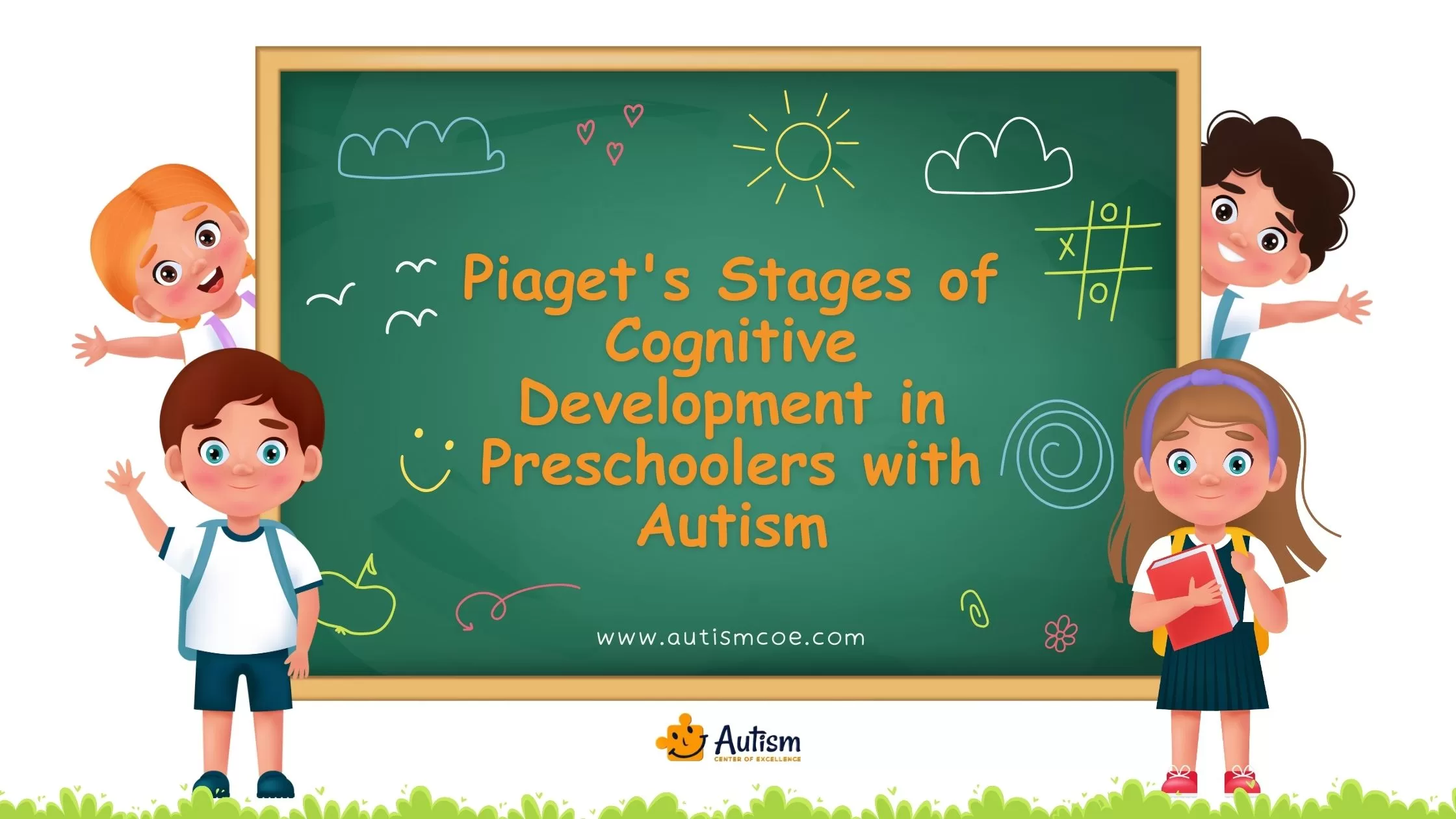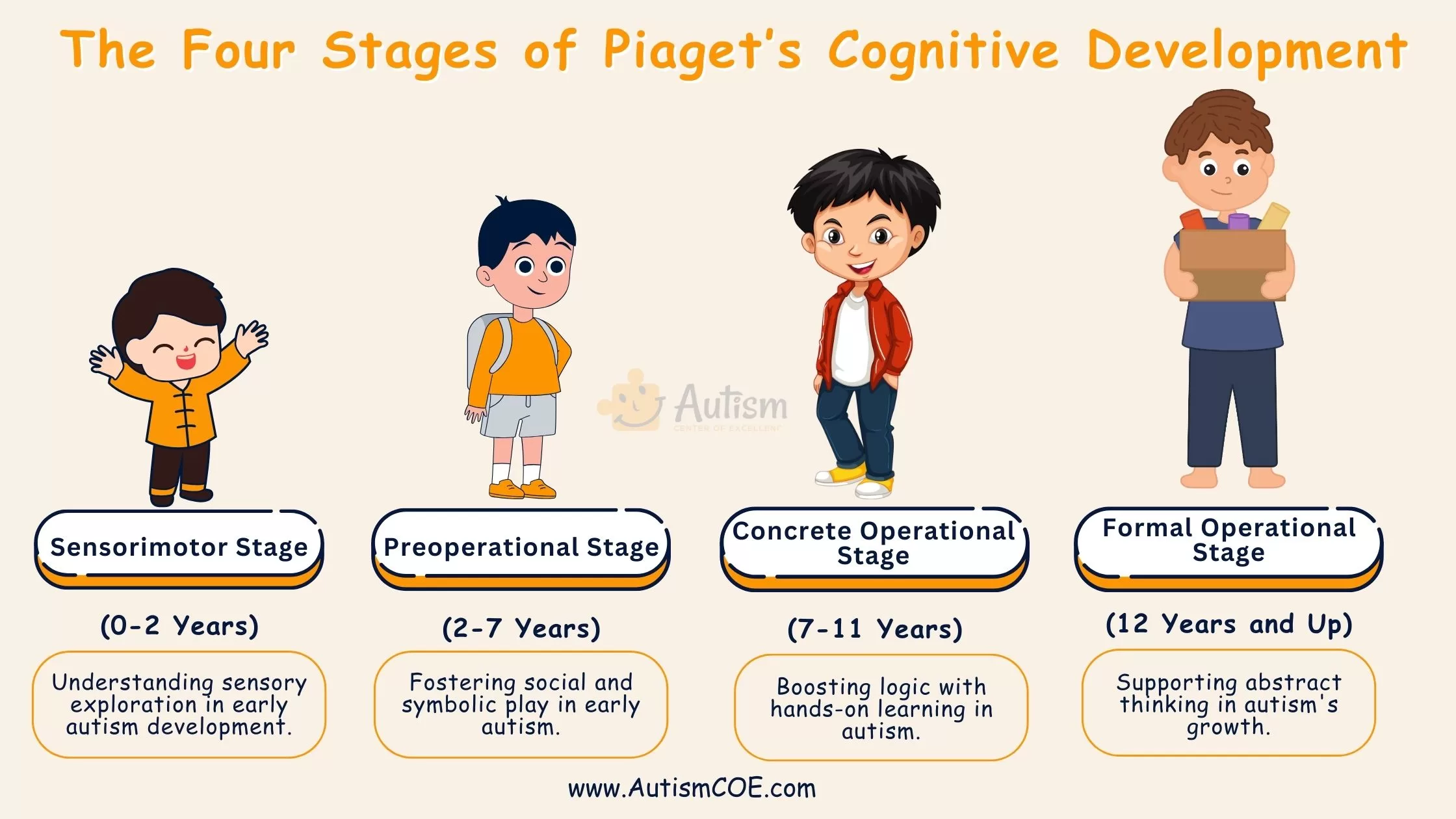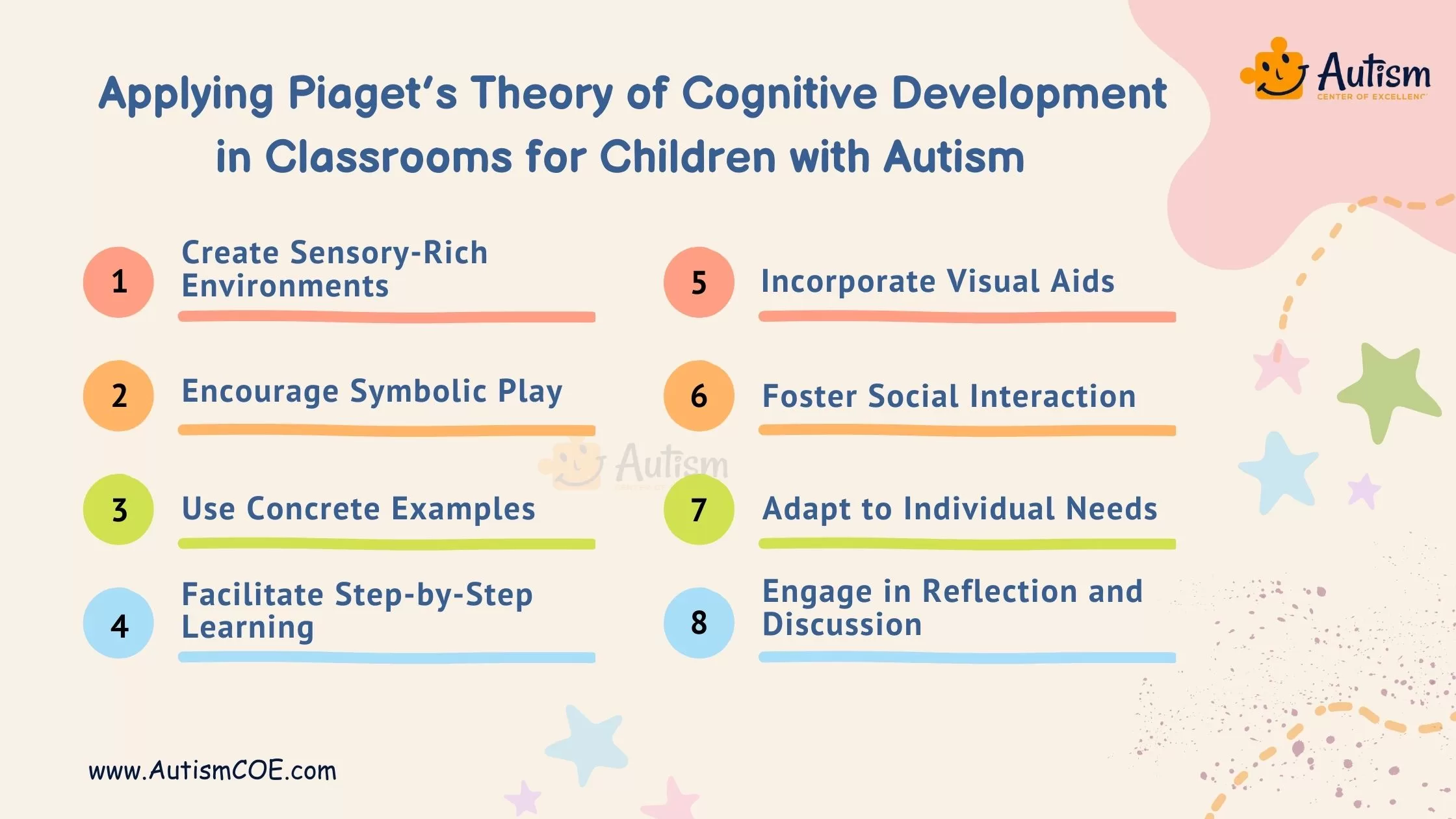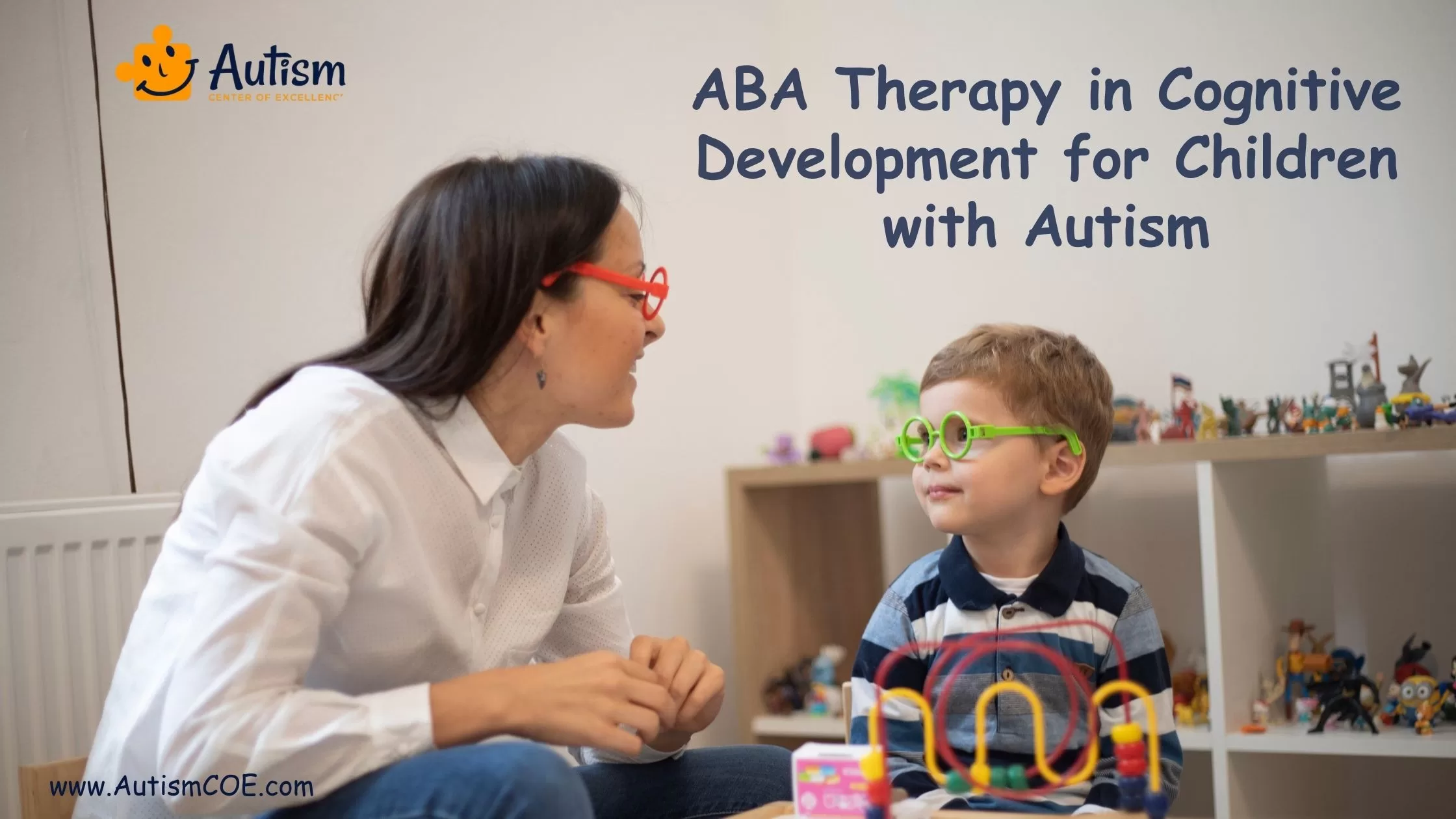Unit 38: Piaget’s Stages of Cognitive Development in Preschoolers with Autism

Understanding the cognitive development of Preschoolers with Autism is essential for fostering a supportive and adaptive learning environment. Rooted in Piaget’s Theory of Cognitive Development, this exploration into Piaget’s theory and its relevance to autism provides invaluable insights for parents, caregivers, educators, and professionals in the field.
The focus on Piaget’s stages helps us understand that each child with autism has a personal learning experience, and working towards it will help us reach and develop their potential. That insight, in addition to helping meet their developmental needs, brings in a positive view of how their cognitive growth is going to come to an important place socially. That’s why we strive for the maximum development of each one of them.
What is Piaget’s Theory of Cognitive Development?
Piaget’s Theory of Cognitive Development is a cornerstone in understanding how children perceive and interact with the world as they grow. The theory first draws from Jean Piaget, who described how children advance through specific stages of cognitive development, each characterized by unique ways of thinking and learning.
Through a sharp change in our perspective with regard to child development, Piaget’s work put great emphasis on the fact that children are actively constructing knowledge. In the world of a Preschooler with Autism, parents, caregivers, and educators will find an appropriate theoretical framework to appreciate the diverse ways these children understand their surroundings and interact with them.
Knowing these cognitive stages through which children with autism might navigate differently will help us have more precise, personalized learning strategies that we could offer to support their development and maintain a setting that is more inclusive and understanding.
Suggested: Unit 4: Cognitive Development and ABA Therapy for School Readiness

The Four Stages of Piaget’s Cognitive Development Explained
According to Piaget’s cognitive development theory, it is characterized by four major stages of development, namely Sensorimotor, Preoperational, Concrete Operational, and Formal Operational.
Every phase represents a new age of the cognitive system and children’s understanding. It is essential to know these stages, which offer a blueprint for typical developmental age expectations and education strategies, especially for children diagnosed with autism. Upon understanding these stages, parents and educators can offer a nurturing environment in which each Child with Autism feels at liberty to grow.
1️⃣Understanding the Sensorimotor Stage in Autism (0-2 Years)
The Sensorimotor Stage is the very first stage that covers birth to two years and is marked by exploration of the world through the senses and motor activity. For children with autism, sometimes this stage can be quite different regarding what these children might focus on and how they interact with their world through movement.
Understanding this means creating environments that foster sensory exploration yet support early cognitive and motor development. These needs might be acknowledged and constructed for the development of further learning and interaction.
2️⃣The Preoperational Stage and Autism in Preschoolers (2-7 Years)
Children in the Preoperational Stage begin playing symbolically, and their language skills grow. This is often one of the most difficult stages for a child with autism regarding social development and imaginative play. However, opportunities are found in using activities that focus on social interaction and communication to foster growth.
With Piaget’s knowledge, caregivers and educators can use strategies to encourage expression, interaction with others, and understanding of their environment.
3️⃣Concrete Operational Stage and Learning Challenges in Autism (7-11 Years)
The concrete operational stage is the initial stage whereby children are capable of logical reasoning as well as the proper comprehension of concrete ideas. A child who has autism at this stage may experience problems with abstract thinking and social reasoning.
The gap may be bridged; however, if teachers’ pay attention to concrete examples and hands-on activities, then it makes more sense and is much easier to learn. It is through patience combined with specific strategies for such conditions that tremendous cognitive leaps can be seen in students with improvement in problem-solving mechanisms.
4️⃣How the Formal Operational Stage Relates to Children with Autism (12 Years and Up)
As such, abstract and hypothetical thinking is a characteristic of the Formal Operational Stage. The onset of this stage in older children with autism may be quite variant, and they might need more assistance in developing it. One main role that educators and caregivers play is to afford the opportunity to acquire abstract concepts through practical scenarios applicable to real life.
It is only when the nuances of this stage are understood that support is more effective in encouraging higher-order thinking and reasoning to open doors to greater independence and surety in adolescence and beyond.

Applying Piaget’s Theory of Cognitive Development in Classrooms for Children with Autism
By applying these strategies, educators can effectively integrate Piaget’s Theory into their teaching practices, creating a nurturing environment that supports the Cognitive Growth of children with autism. Here are some effective strategies to integrate Piaget’s concepts into teaching practices, fostering cognitive growth and social skills.
Create Sensory-Rich Environments
To implement Piaget’s concepts at the Sensorimotor Stage, ensure that your class is rich with sensory experiences. Use tactile materials, diverse textures, and visual stimuli to help a child who is autistic explore and understand their world.
Encourage Symbolic Play
In the Preoperational Stage, symbolic play is very important. Manage opportunities for imaginative play with props and role-playing exercises. This can help children with autism develop language and social skills in a non-threatening and interesting way.
Use Concrete Examples
Concrete operational thought is characterized by the ability to think logically and solve problems. Use real-life examples or hands-on activities to help children with autism understand abstract concepts, making learning more meaningful for them.
Facilitate Step-by-Step Learning
Break down the complex task into smaller, manageable steps. This facilitates easy progressive steps through the stages of Piaget, further solidifying the child’s confidence and cognitive development.
Incorporate Visual Aids
Visual Aids Make use of charts, diagrams, and pictorial directions to explain the tasks. These are especially handy teaching tools in class and really help with understanding and retention for the visual student.
Foster Social Interaction
Social development that fosters peer interaction ensures the promotion of social skills and learning of children with autism through structured group activities and cooperative learning sessions.
Adapt to Individual Needs
One child might take the Piaget learning stages in a different route than another. Be flexible and ready to adjust your teaching approach to the different needs of children with autism to provide the tailor-made support that each child needs.
Engage in Reflection and Discussion
This encourages children to reflect on what they learn and to discuss their thoughts with other people. This activity promotes critical thinking and ensures that children can verbalize their understanding and experiences.
Enjoying Reading?
Join Our Weekly Newsletters!
Subscribe now to stay updated with our latest email updates.
Comparing Piaget’s Developmental Stages and Autism Learning Stages
A comparison of Piaget’s developmental stages to those of autism learning stages indicates that, while the works of Piaget outline a very structured path of cognitive milestones, children with autism may move through them in a more individualized manner.
Autism and learning stages are marked by a more individualized progression whereby all of the developmental markers appear perhaps out of sequence or require different approaches to learning and understanding.
That information, further connected to autism-specific learning patterns, would serve parents, caregivers, and educators in developing a more focused education and making sense of one’s specific journey as encouraged by each child.
This understanding better enhances the learning experience and instills an environment that is much more inclusive in assisting the cognitive and social development of the child with autism and ultimately enables the child to achieve their full potential.
Challenges and Considerations
Piaget’s theory of cognitive development to children with autism poses unique challenges and considerations with profound nuances. Children with autism experience atypical progression through Piaget’s stages, often requiring extra time and alternative approaches to grasp certain concepts.
Thus, educators and caregivers should be able to recognize that the steps Piaget designed for the rigid sequence of developmental milestones need not be adjusted to fit every child’s learning journey strictly. The teaching strategy should consequently adapt to changes in learning needs to offer personalized help to the child.
Educational practice succeeds in overcoming such challenges by bringing out the virtues of patience, creativity, and flexibility. Educational professionals can ensure that all children with autism have meaningful cognitive and social development through their work on strengths and the creation of a facilitative environment encouraging exploration and discovery.

The Role of ABA Therapy in Cognitive Development for Children with Autism
ABA (Applied Behavior Analysis) Therapy is an effective intervention for enhancing the cognitive development of children with autism. It uses structured techniques and positive reinforcement to improve behaviors such as communication and social skills.
By aligning with Piaget’s developmental stages, ABA provides practical methods to achieve cognitive milestones. This therapy is relevant to Piaget’s theory in that it offers personalized support on aspects of learning needs in autistic children.
Some of the key benefits are making every child grow and more adaptive and reaching their full potential through wholesome environments made possible for them.
Frequently Asked Questions & Answer
Can Piaget's Theory Help Parents Understand Their Child's Development?
Absolutely! Piaget’s Theory is beneficial for parents because it gives them a framework upon which to present structure in understanding how their child’s cognition grows. It mentions key developmental milestones that parents would well see in recognizing their child’s learning journey, especially those children with autism.
What is the Main Significance of Piaget's Stages of Development?
Piaget’s stages of development are a description of how children’s cognitive abilities develop sequentially. The stages help educators and parents understand normative patterns of learning as well as behaviors that children exhibit in their perception and exploration of the world. This plays a crucial role in understanding how to support children’s learning.
Do Children with Autism Progress Through Piaget's Stages Differently?
Indeed, children with autism can change in a non-linear way. The variations are fundamental so that the teacher and the carer adjust what they teach or what they expect so they can help meet the needs of every child along the unique learning journey.
Does Piaget's Theory Address Social Development in Autism?
While Piaget’s theory focuses primarily on cognitive development, it indirectly touches on social development through the need for exploration and interaction. Therefore, it can be applied as a framework by educators to create environments that foster social learning for children with autism, effectively helping them build communication and interaction skills.
Conclusion
Piaget’s Theory is so invaluable in illustrating the cognitional development perspective on autism in not only providing a framework foundation that would decode special or unique ways children with autism progress through developmental stages but also attempting to highlight cognitive milestones possibly carried out in non-linear sequences as most children on the autism spectrum might experience.
The knowledge of the phases will allow teachers and carers to plan effective teaching methods that would help in the development of the requirements of each child, giving them the greatest opportunity to succeed. Dealing with the strengths of Piaget’s theory about the growth of cognition in children equips educators with a more Inclusive Learning and teaching environment. It reassures parents and carers of how appropriate their children’s path towards achieving their full potential is.
Please Note: The content of this blog is for informational purposes only and should not be considered a substitute for professional medical advice, diagnosis, or treatment. Consult a qualified healthcare professional for personalized guidance tailored to your specific situation.

Bhavika Bhasin
Bhavika Bhasin is the Research and Marketing officer at AutismCOE. She works with children and adults with ASD. Her clinical research includes evaluating various available autism screening and diagnosis methods and their efficacy. She is currently developing a novel screening exam that is indicated to be more accurate than the existing available exams. She is also writes articles papers for various publications.

